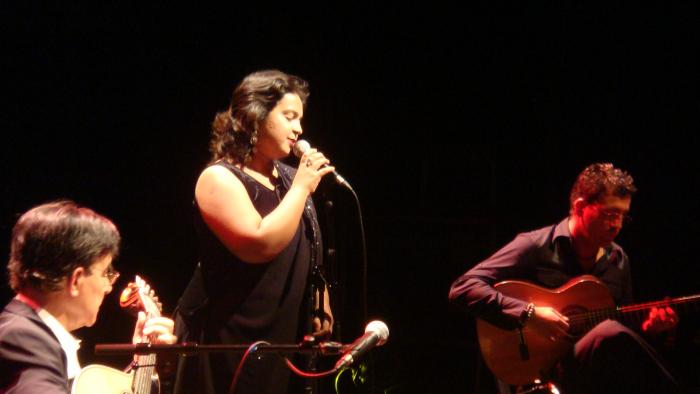Fado music is a form of Portuguese singing that is often associated with pubs, cafés, and restaurants. This genre of music has much earlier origins but is believed to have originated in the 1820’s in Portugal. Fado is generally known for being emphatically expressive in nature, as well as being profoundly melancholic.
Generally, in fado music, the singer will sing about the hard realities of the daily life, balancing both resignation and hopefulness that a resolution to its torments can still occur. It can be described by using the Portuguese word “saudade”, which means “longing” and stands for a feeling of loss. This loss is generally a permanent loss and of long-term consequences. Fado music often has one or two 12 string guitars, one or two violas, and sometimes a small 8 string, bass.
Fado has two main varieties and you can read about there here.
This genre was brought to the music world mainstream by the Queen of Fado, Amalia Rodrigues (July 23, 1920 – October 6, 1999). Known as Amalia, to the world she became one of the most important personalities for the genre and the main inspiration for contemporary and modern Fado. the lady had a personality, charisma, extraordinary timbre of voice, and beauty that made her an acclaimed artist whose services were requested by Monarchs and Presidents.

Here’s one of the more famous fados by Amalia.
The Fado de Goa contest at the Semana da Cultura Indo Portuguesa 2017
In keeping in with the tradition of past years, the ninth edition of the Semana da Cultura Indo Portuguesa will host the 5th Fado de Goa Contest, a fado singing competition. The contest will take place at the Instituto Menezes Braganza hall in Panjim.
This genre of music has been a much-loved part of Goa’s art and music for many years and the experience in the last three editions of the contest has brought forward a few potential fadistas.
The first ever fado singing competition which was held in 2013 saw a lot of young talent emerge.
The Taj Hotels and Resorts have partnered with Semana da Cultura Indo Portuguesa (Goa) and taken the initiative to spread awareness about this beautiful art form in Goa.
The competition will have three categories; 10 to 15 years, 16 to 21 years of age and above 22 years. The past editions have seen Nadia Rebelo, Daniella Fernandes and Claudette Fernandes among others winning the competition and taking up to Fado singing.
In order to match the culturally rich standards of the past, preparation sessions and an interactive workshop with Carlos Meneses and Orlando Noronha will be conducted ahead of the competition. These sessions and workshops will help the participants to train and hone their skills at singing this music genre. The workshops will be held in Panjim and Margao for the contestants.
The Fado Culture in Goa
Thanks to Semana da Cultura Indo Portuguesa, Goa has witnessed concerts by some noted Fadistas from Portugal like Maria Ana Bobone, Cuca Rosetta, Deolinda, Miguel Capucho, Claudia Duarte and also some Indo Portuguese fusion performances by Goas Nightingale Sonia Shirsat and noted classical singer Praveen Gaunkar.
Semana Da Cultura Indo-Portuguesa (Goa) is supported by the Consulate of Portugal, Clube Vasco-da-Gama, Clube National, Clube Harmonia, BPS Club, Indo-Portuguese Friendship Society, Fundação Oriente and Institute Camões.
ItsGoa/OCT/KDGP


